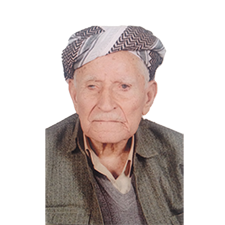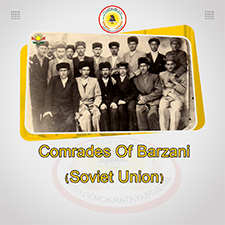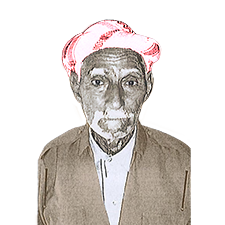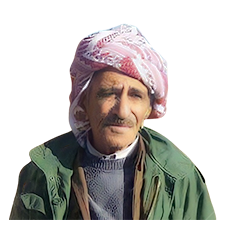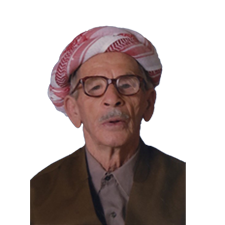Biography:
On November 1951, he returned to Vrevisky. After that, on February 15, 1954, Mula Mustafa Barzani inquired Mohammed Amin Faqe to enhance his cultural and professional level; with the approval of Soviet Union officials, he was accepted in the institute and graduated from the Department of Agriculture and procured his diploma.
In 1952, he got married Aisha Omar Osman, who was an Uzbekistani. Eventually, he returned to Kurdistan, specifically on April 16, 1959, through the harbor of Basra in the southern Iraqi Republic. Following the defeat of the Eylul insurrection in 1975, he went to Iran and he came back to Kurdistan after 2 years. After fourteen years of suffering with brain stroke, unfortunately on June 30, 2022, he entered eternal rest.
:Service Record
Mohammad Amin Faqe Hassan Dargalayi was one of the lionhearted Peshmergas of the Kurdistan Republic in Mahabad. With many brave men of that time, He accompanied Sulaiman Beg Dargalayi from South Kurdistan to East Kurdistan sacrificing his life for the sake of Kurdistan's independence and emancipation. Thenceforth, they were given the honor of becoming Peshmerga in the Ministry of War of the Kurdistan Republic. In addition to it, On March 31, 1946, he affiliated the Kurdistan Democratic Republic Army's Barzan unit, and he took part in the fights of Nalos and the historic battle of Qarne. It should be noted that, He was a brave and courageous Peshmerga who fiercely defended his purposes in these conflicts. In one of the fights, while defending, a bullet struck his weapon and splitting it in half. Despite the threat to his life, he continued to shield with courage and bravery.
The bravery of Mohammed Amin Faqe Hassan Dargalayi had an immense effect on the courage of the Peshmerga and his Barzan force companions. Hence, this courage was the reason for the Peshmerga forces' victory in the fight and the defeat of the Iranian army and according to Iranian publications at the time; it was the Iranian army's worst military defeat.
On April 19, 1947, Mohammed Amin Faqe Hassan Dargalayi, together with hundreds of other Peshmerga, began their expedition and chose to continue to fight under the command of General Mustafa Barzani. From June 9, 1947 to June 11, 1947, he participated in the battles of Qtur People and Mako Bridge (East Kurdistan). Thus, on April 23, 1947, alongside Mustafa Barzani, Rasheed Mir left to Soviet Union and took part in the Gali Qtur and Prdi Mako battle.
After much difficulty, in June 18, 1947, on the Iranian-Soviet border, Mula Mustafa Barzani and his force crossed the Aras River. Following their arrival in to Nakhchivan, Azerbaijan on June 19, 1947, Mustafa Barzani and all of his companions were imprisoned for forty days. In fact, they were given the same treatment as prisoners of war in terms of food, clothing, and transportation while living in a camp which was surrounded by barbed wire and guarded by soldiers. Not long after, by decision of Soviet Union government, they were divided into groups and transferred to the regions of Aghdam, Lachin, Ayulakh and Kalbajar in the Republic of Azerbaijan. By December 10, 1947, they were moved to a military base on the Caspian Sea in Baku, the capital of the Republic of Azerbaijan. On the 23rd of the same month on the Caspian Sea in Baku, the capital of the Republic of Azerbaijan, Barzani's followers were organized into a military regiment and received training in military tactics and politics and taught to read and write Kurdish by their other educated Peshmarga.
As a result of Jafar Bakirov's mistreatment, On August 29, 1948, Mula Mustafa Barzani made the decision to relocate his military camp from Azerbaijan to the village of Chirchuk close to Tashkent, the capital of Uzbekistan, where they sustained their military training.
Following that, in March 1949, Mula Mustafa and his friends were split up into groups and sent by rail to the countryside of the Soviet Union, where they worked on the kolkhozes' crops. (Land that people rented from the government and then returned to it).
On April 16, 1959, Mohammed Amin Faqe returned to South Kurdistan with his comrades on the ship Grozia via the port of Basra in the southern Iraqi Republic. After returning from the Soviet Union, he was employed as an agricultural supervisor in the Agricultural Executive committee of Sulaymaniyah and settled there. Nevertheless, with the first shot of the Great Eylul Revolution in 1961, he left Sulaymaniyah along with several friends who also worked there and returned to Dargala, where they joined the Peshmerga.
After the agreement between the Kurdistan Revolution and the Baghdad government on March 11, 1970, Mohammed Amin Faqe returned to his work in Bakrajo, Sulaymaniyah. He spent a year in the city before moving to Erbil, where he worked in Khabat Town's agriculture office. However, due to the distance between the place and his hometown, he moved to the agriculture office in the Choman district for a year before settling in Dargala.
During 1974, after the Iraqi administration withdrew from the March 11 agreement to continue the combat, Mohammed Amin Faqe Hassan Dargalayi took up arms again as a Peshmerga. Throughout the Eylul Revolution, he had a variety of positions and responsibility, including: head of the wing, head of the branch, deputy of the fourth battalion. Additionally, he was then the deputy commander of the Hindren force and the chief of the force's branches. As a matter of a fact, he was a brave Peshmerga commander who took part in the majority of the Eylul Revolution's operations, as well as the fights of Zozk, Handren, Korak, Ali Beg, Gornok, Megar, and others.
In 1975, following the tragic Algiers Agreement, Hamademin Faqe Hassan moved to Iran with his family and stayed for a while. In late 1976, he returned to South Kurdistan but was deported to southern Iraq and compelled to reside there for two years before returning to Kurdistan. For the reason that he was highly suspected by Baath Party associates, they compulsory made him to reside in Rawanduz. Eventually, He went back to Rawanduz and continued working at the city agriculture office until his retirement. After fourteen years of suffering from brain stroke, unfortunately on June 30, 2022, he entered eternal rest after a life filled with struggle and fight for Kurdistan's independence.
Sources:
- ئەرشیفی دەستەی ئینسکلۆپیدیای پارتی دیموکراتی کوردستان




